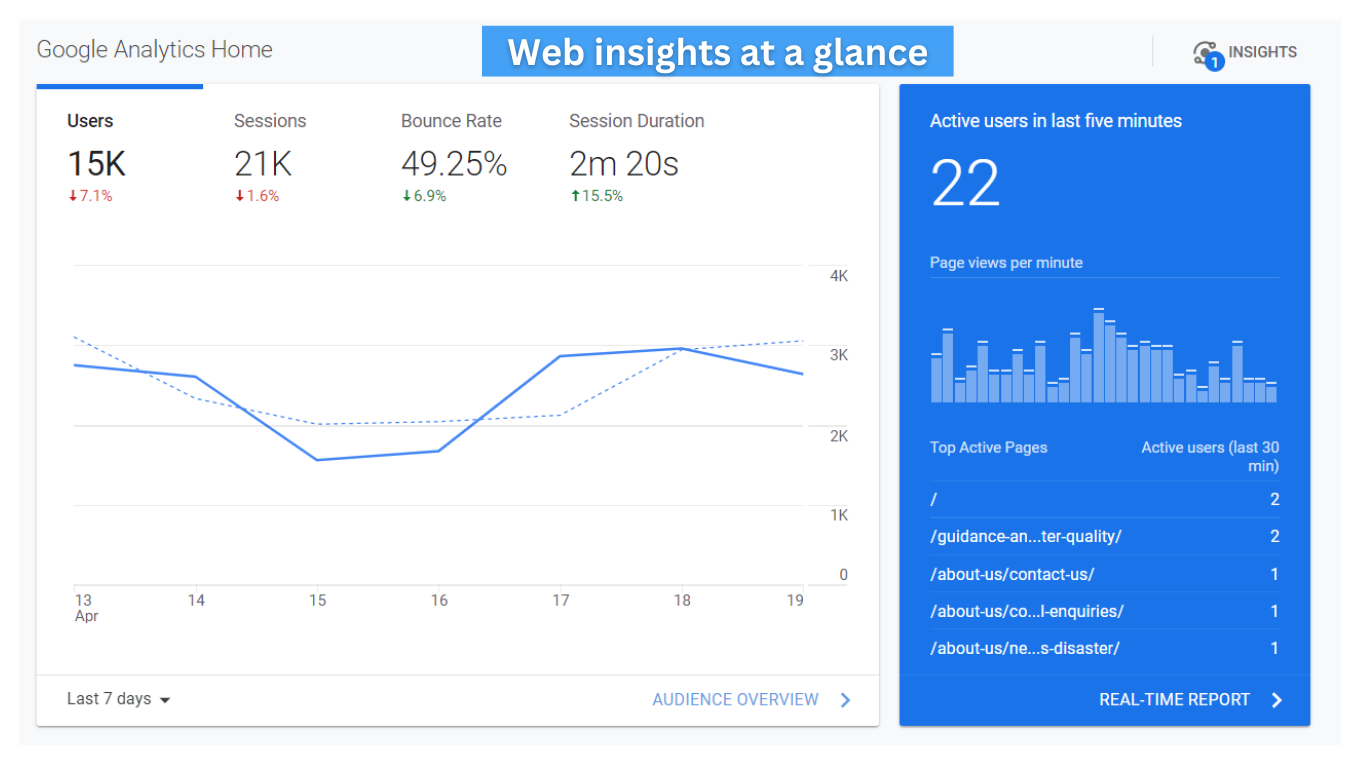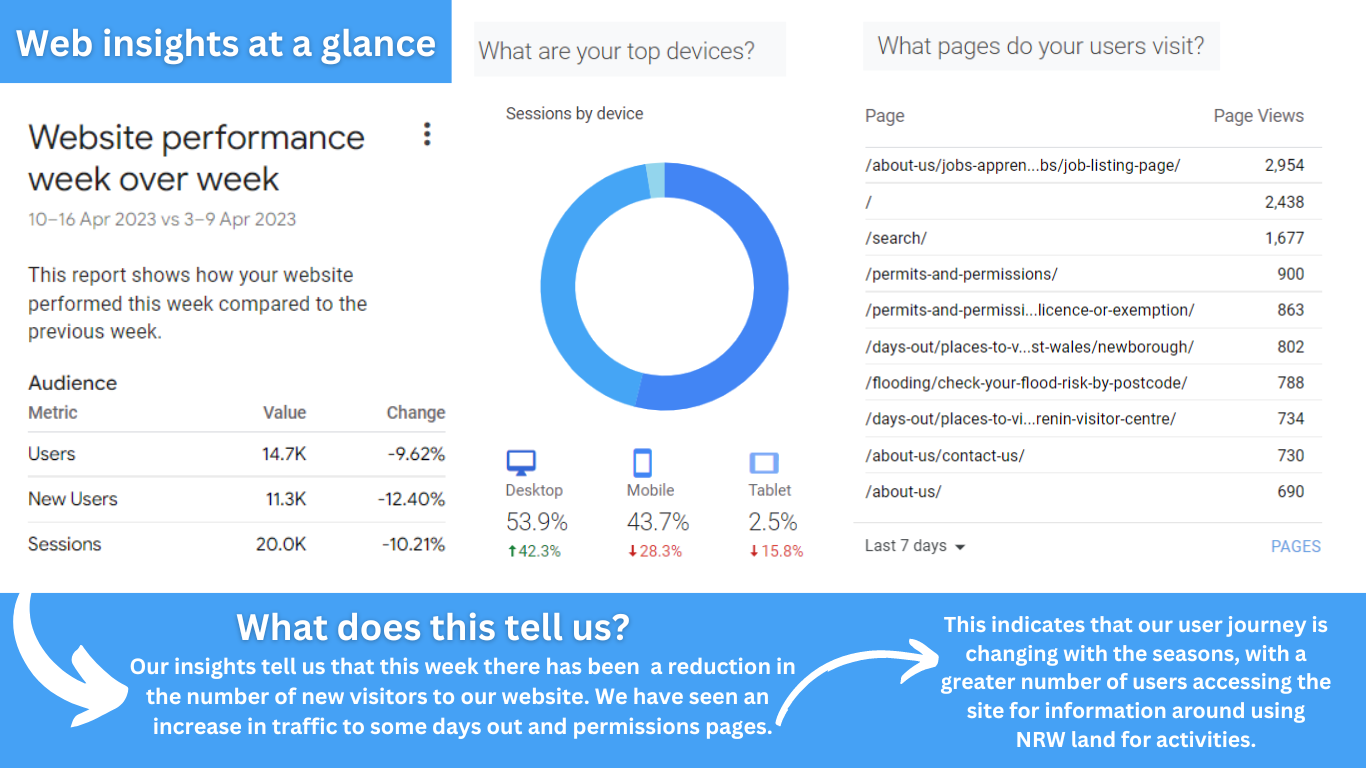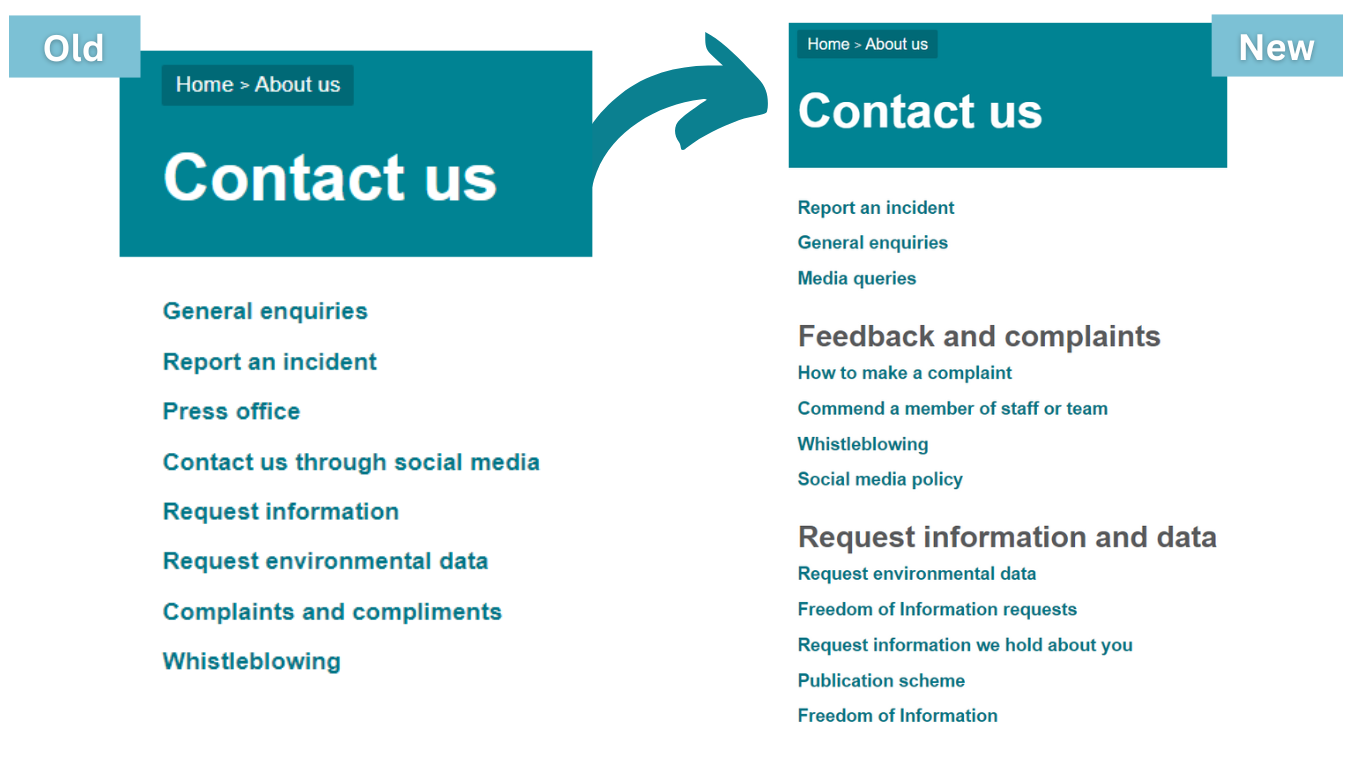Weeknotes 21/04/2023
Another busy week in the Digital Services team, with some of us off on annual leave (happy birthday Lucinda!), and the rest of us picking up all the work that was put on hold last month due to time constraints.
Keep reading to find out more about what we’ve accomplished this week…
Brushing up on best practice with CDPS and ONS experts
This week, some of us attended a webinar that shared retrospective learnings from the process of designing and building a Census, with the hopes of learning more about how our team can overcome the challenges we face when transforming NRW services to the digital space. The webinar was led by ONS experts, Rob Doherty, Helena Rosiecka and Sarah Jones who coordinated the design of the Census 2021.
This digital service webinar is the first session in the 3-part webinar series hosted by CDPS and ONS. A key barrier for us is ensuring users of various levels of digital literacy are able to access and simply complete a task using an online system.
We found the session very insightful and it reinforced some of the key learnings that we’ve been building into our design processes, including:
-
Considering whether language can be better used to guide users through a task. For example, during unprecedented circumstances such as the Covid pandemic, there was a need to add further clarification for some questions in the census to ensure the questions were completed correctly, and the resulting data was accurate.
-
Technology can be utilised effectively to reflect users’ answers back to them, which gives users a chance to notice and correct mistakes in their responses.
-
User research and insights should lead the development of content design, to centre the user and create a digital service that works well for them.
Learning from our web insights
In the past week, the sun has been shining across many areas of Wales.
As such, we’ve experienced a drop in website traffic which demonstrates the public’s reliance on our services in times of flooding and poor weather. Interestingly, there has been a 9% drop in users accessing our online services, and a further 12% drop in new users accessing the site.

Our web traffic insights also show an increase in users accessing our website via a desktop computer as opposed to mobile or tablet devices. The increase in the desktop users might indicate that we’re having more visits from professional users compared to members of the public. Professional users like local authorities, consultants and NRW staff are more likely to access our site on a desktop than a mobile device.
However, nearly half of all visitors to the NRW website are doing so via a smartphone, so ensuring our web pages are optimised for both desktop and mobile users is as important as ever.
Some of our web’s most popular pages this week include the jobs board, as well as the permits and permissions and check your flood risk webpages.

As we enter the warmer months, we see a rise in traffic on the days out pages, and so we are continuing to work to improve our service for people who want to have access to or do something on our land, such as horse riders who are taking advantage of the sun to go out and ride their horses.
Communicating, not duplicating
We had a meeting with the communications team to look at how we can improve the web content they publish. Our recent audit flagged lots of out of date content and duplication of content.
The ‘statements’ area of the website is notorious for being a bit of a dumping ground. It’s full of different content types and it’s not clear who the content is written for. In some cases we have multiple press releases and statements about the exact same thing. We’re going to begin to unpublish out of date or duplicated content. The rest will be moved into the correct content type to ensure consistency across the section.
We also have a section on the site about high profile ‘projects’. For example, building a new flood defence or carrying out conservation work. These pages have information about the project, including maps and methods to contact the project team.
The problem is that each project often has some kind of consultation, various press releases, and blogs too. It’s really hard to link all this info together and keep it up-to-date, which makes it hard for users to find the latest information.
From now on, all information about specific projects will be published on Citizen Space instead of the website. This gives users functionality to view and take part in consultations, move and zoom in on maps, and there’s even an advanced search option. It can be easily found from Google and can be linked to from our website.
We’re reflecting these changes in our soon to be published content types for:
- press releases and media statements
- projects
- blogs
We will keep working with comms to see how they get on with these changes, and of course keep an eye on our analytics and feedback from users.
Out with the old, in with the new…
This week you may have spotted new headings in the contact us section of the website. The introduction of logical headings to help break up the content into user focused tasks will hopefully help users navigate to the right contact route, depending on the type of query.

We are also initiating a new monthly capture of the whole website, including all the documents, using MirrorWeb, a leading data archiving platform to help us create accurate records of our digital content.
Other things we’ve been working on:
-
James is holding user interviews to test the new ‘Woodlands and forests’ landing page. He’s also working on the design of the replacement Flood Warning System.
-
Sophie and Heledd have continued to build a clearer structure in the strategies and plans section of the website. They have also begun looking at rebuilding the publication scheme to ensure it is an accessible, useful resource for visitors to our site.
-
Andrew has continued working to recreate paper forms into digital forms online that allow users to input their information and receive guidance on waste permits and more.
-
Heledd and James joined a presentation hosted by Jo Carter from We are Service Works, with Sports Wales. They were talking through their Service Design principles, and the work of their new Digital and Service Design team. It’s great to see the growth in digital and service design approaches in the Welsh public sector, and see colleagues from other NRW teams joining in too.
-
Phil and Kim have been setting up Sophie on the SmartSurvey platform and showing her the ropes in building paper forms into online ones.
-
Thanks to Owain, we can now track analytics on Citizen Space and he has continued to work on the GA UA to GA4 migration work.
-
Kim has been updating areas of the Intranet that contain broken links and out-of-date information to ensure staff have access to the latest information via the Intranet.
-
Shaun is working on guidance for developers and farmers constructing agricultural developments and complying with intensive farming environmental permit conditions. There’s a large amount of crossover between the different sets of guidance which means we need to consider how a user might find the guidance and then navigate their way through the various pieces. To that end, Shaun has held meetings with the river SAC project team, the installations regulatory team and development and planning. This work is also highlighting some of the issues we have with the information architecture (structure) of the site. There is confusion among staff and so also for users about whether guidance on agriculture should be homed in the ‘farming’ section of the site, the ‘permitting’ section, or the ‘development and planning’ section. In an ideal scenario the different sections (top level navigation) would be mutually exclusive. Exploring these issues now will help inform any future work on the site structure.